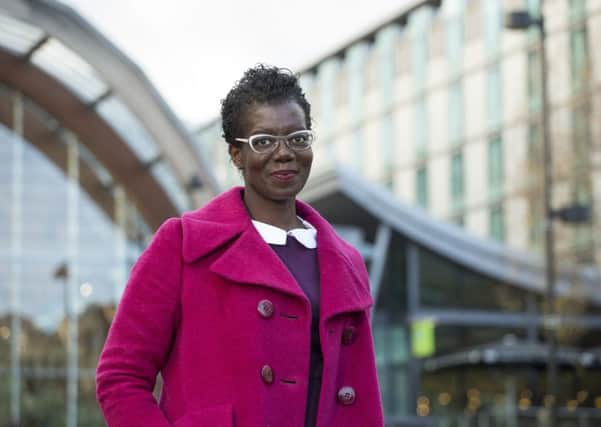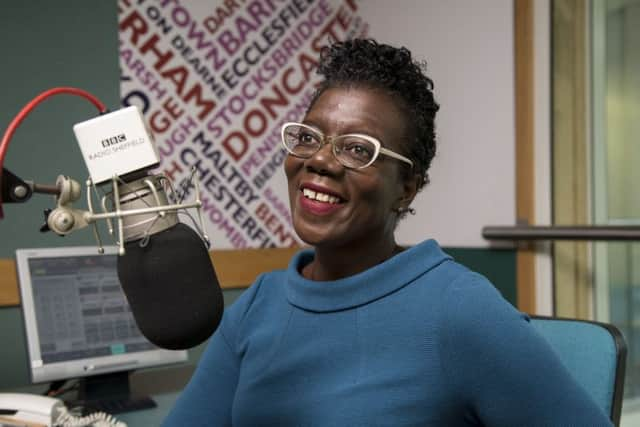Star Interview: Sheffield broadcaster's journey from the classroom to the airwaves


“They wanted their children to have things they didn’t have. I think I am who I am because I was born here.”
But for the first time, the BBC Radio Sheffield presenter has paid a visit to the country where her family has its roots – and the two-week trip to the ‘jewel of an island’ proved to be a revelation.


Advertisement
Hide AdAdvertisement
Hide Ad“It felt like more than a holiday. My dad never went back, although he hankered to, and my mum still has sisters and brothers there, so she has been back a couple of times, but I never really had the desire to.
“There were places I wanted to go more. But all my friends born in Britain said I needed to go. When I went there and saw how beautiful it was – there was a seven-mile beach with white sands – I thought, how could my parents leave this?”
There was much for Paulette to return to in Sheffield, however.
The radio station’s schedule has undergone a shake-up, meaning her show now goes out from 10am to 1pm on weekdays, swapping with Rony Robinson, who has taken the 1pm to 3pm slot.


Advertisement
Hide AdAdvertisement
Hide Ad“It’s been a while since we’ve had a refresher – you do perform better when you’ve got new challenges,” she says.
“It’s quite similar to what we’ve been doing, but we’ll focus more on people’s stories, and on bringing the audience to us. The idea is to respond to the news but not to be all about the news. Most people don’t think their stories are worth telling.
“We want to reflect the rich tapestry of stories that we’ve got in this part of the country.”
Paulette’s life is a remarkable tale in itself. Aged 52, she was brought up in Pitsmoor and Burngreave, the second oldest of six children, by her dad James – known as Alec – and mum Ethlyn.
Advertisement
Hide AdAdvertisement
Hide Ad“My brother came with my parents but I was the first child born here. In Jamaica, they give people pet names, so my mum was Dotty and my name was Bobette.”
She adds: “I enjoyed growing up in that area of the city. It was quite multicultural – I just thought everywhere was like that. There were issues, as there still are in that area. If somebody came through the area that wasn’t familiar with it, they could be quite racist, but on the whole it was a healthy environment.
“I think Sheffield is diverse today but I do think sometimes the diversity is limited to certain areas.”
Paulette attended Earl Marshal School – replaced by Fir Vale Academy – and then became a teacher herself, working mainly at Waltheof School, now Park Academy on the Manor.
Advertisement
Hide AdAdvertisement
Hide AdShe taught English and French there, and was a year head, taking immense pride in the job.
“I’d always wanted to be a teacher since I was a little girl, and my parents were really proud. My mum said ‘That’s what we came to England for’ – she never thought she could be mother to a teacher.”
But Paulette was devastated when she had to leave the vocation she cherished for health reasons when serious illness struck.
“I had fluid on the brain – I had awful headaches and felt disorientated. I had an infection, basically, and it developed into something more sinister. I couldn’t carry on working, which was really hard for me.”
Advertisement
Hide AdAdvertisement
Hide AdPaulette was fitted with a shunt – a thin tube – to drain off the fluid, but a further blow was to come when medics performed a full body scan.
“They found out I’d got cysts in my womb and around my ovaries. I needed quite a bit of surgery and realised I wouldn’t be able to have children, which I always thought I would. I was in my mid-30s at the time.”
To keep herself occupied, she began writing pieces for Radio Sheffield’s website – the staff ‘saw her coming and going’ and, 15 years ago, Paulette was offered a receptionist’s job for three to four hours a day.
“The radio station was a very cheerful, positive space to be in. To be honest I didn’t have any intention of being on the air. It was nice being on reception, and good fun. It felt quite lazy after teaching.”
Advertisement
Hide AdAdvertisement
Hide AdMaking the switch to broadcasting happened purely through ‘good old-fashioned nosiness’.
She asked presenter Ony Bright, who was in charge of a world music show on Saturday nights, how radio worked, and she was invited to the studio to find out.
“She said ‘Why don’t you come and have a look?’ She didn’t have any support, and while I was there she needed someone to answer the phones. So I just came in and helped her out with that.”
Soon she was asked to read out the ‘what’s on’ listings on air.
Advertisement
Hide AdAdvertisement
Hide Ad“One of the managers, David Markwell, said he liked the sound of my voice on the radio. I never thought broadcasting was for someone like me – I thought it was for people who had been trained. But gradually they asked me to do more and more. Each time I did something, I thought: ‘I can do this’.
“I just enjoyed the challenge and enjoyed talking to people and being on the air, and people said they liked to hear it.”
Paulette began with a show called New Black, focusing on the African Caribbean community, before moving to a mainstream, daytime programme.
“Those issues should be reflected across the output so people can learn from them and learn about them,” she says.
Advertisement
Hide AdAdvertisement
Hide AdThis week will be a busy one, getting to grips with the new schedule – but thoughts of her recent holiday won’t be far from her mind.
“I’m definitely going back,” said Paulette, who now lives in Firth Park with Dutch partner Ketu, 47, a plumber.
“I left Jamaica on the Sunday and arrived on the Monday morning – the sky was grey and it was chilly, and I’d never really seen the contrast before. It breaks my heart in one respect, but I’m grateful in another.
“My mum can cook really well but Jamaican food is different. And there’s the culture as well – how you treat people and talk to people. The subtleties are quite beautiful.
Advertisement
Hide AdAdvertisement
Hide Ad“I enjoyed it more than anywhere else I’ve ever been, but of course I was looking forward to coming home to Sheffield. This is my home.”
‘Life experience the key to broadcasting’
The secret to being a good broadcaster is ‘not about training’, Paulette Edwards believes – instead, stations should recruit presenters from all walks of life, she says.
“It’s not about training, I realise that now. Some of the young people that come to Radio Sheffield are absolutely brilliant, they’re better at radio than I am, but you just need that seasoning, almost, through life experience.
“You don’t want everyone on the radio to have the same background, or be trained in the same way. How dull would that be?”
Advertisement
Hide AdAdvertisement
Hide AdLike other forms of traditional media, the wealth of local information available on the internet poses a challenge to local radio’s efforts to sustain listener numbers.
“What you want on local radio is personality, subject matter that reflects the area, is interesting to listen to and that you couldn’t find anywhere else.
“I think the state of local radio, and local news, is going to be difficult if we don’t try to offer something different.”
The intimacy of radio means the medium will always triumph for Paulette, though.
Advertisement
Hide AdAdvertisement
Hide Ad“I don’t think other things can touch people like radio can.
“Even with websites, there’s a danger of losing the art and warmth of the human connection that radio still offers.
“My experience of the BBC is that I started listening to Radio 1, and now I listen to Radio 2, 4, and Sheffield. With the licence fee there’s an obligation to reflect the people that pay.
“There’s more responsibility to connect with individuals, not just to make money.”